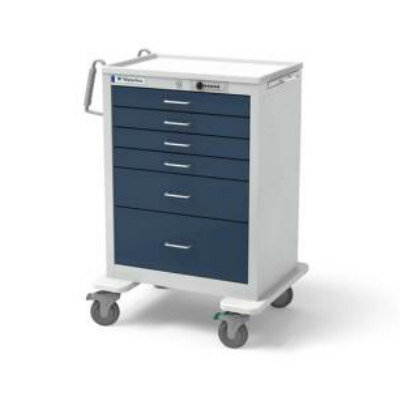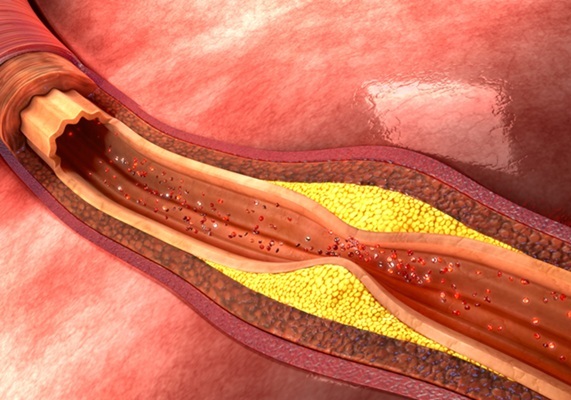Advanced Virtual Surgery Trainer Provides Tactile Feedback
|
By HospiMedica International staff writers Posted on 27 Aug 2018 |
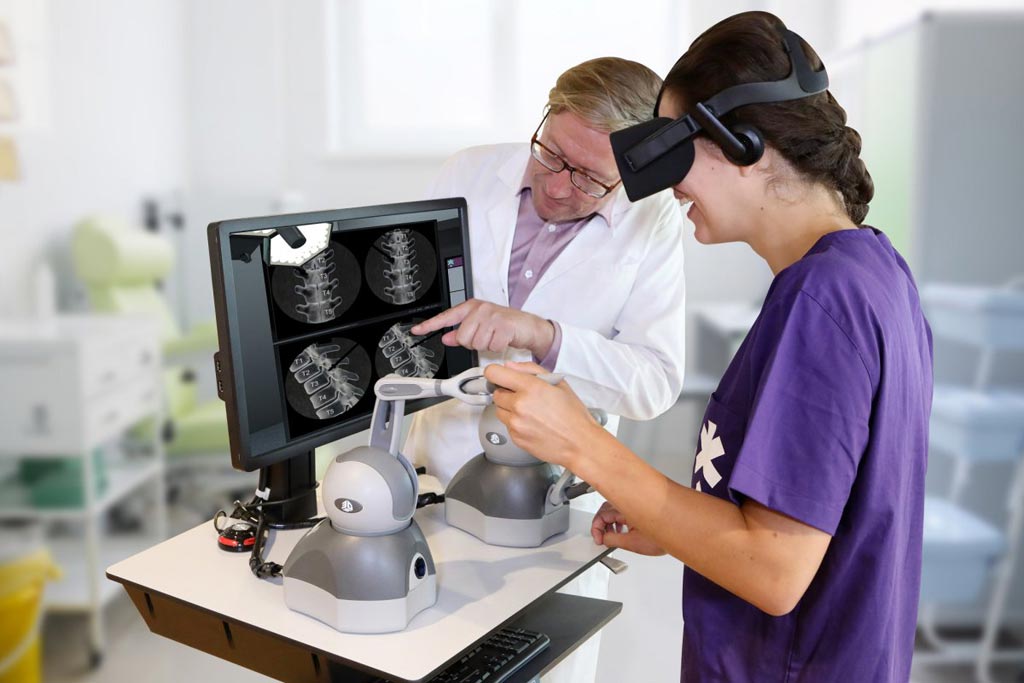
Image: A VR haptic feedback system can train future surgeons (Photo courtesy of FundamentalVR).
A new virtual reality (VR) surgery training platform using haptic and physical feedback to create a tactile, flight simulator-like experience for surgeons.
The FundamentalVR (London, United Kingdom) VR training platform is based on a proprietary surgical haptic intelligence engine (SHIE) designed to mimic the sensation of operating on various types of human tissue, from subcutaneous fat to muscle and bone. Combined with off-the-shelf VR devices and haptic arm devices, the platform provides an immersive training tool for surgeons in waiting. Haptic baselines are created through consultation with a range of surgical specialists, and calibrated through a development process to refine appropriate interactions.
Initial rollout will feature training packages for orthopedic surgery, including pedicle screw placement, posterior hip replacement, and total knee arthroplasty (TKA). During each simulation, users receive real-time feedback on instrument use and technique, procedural accuracy, and impact on the patient. The system can also randomly present rare complications or scenarios, such as unexpected bleeding, an abnormal anatomy, or a change in the patient’s condition. And as the SHIE platform works with standard VR and haptic equipment, it is updated in tandem with new developments in the fast-growing haptics space.
“Our mission is to democratise surgical training by placing safe, affordable and authentic simulations within arm’s reach of every surgeon in the world,” said Richard Vincent, CEO of FundamentalVR. “As we continue to develop and deploy our Haptic Intelligence Engine (SHIE) we are in effect building a hardware agnostic haptic map of the human body, which as other hardware solutions such as haptic gloves become economically viable for wide-scale medical use, we will be able to port directly into.”
Current surgical training for surgeons is largely confined to the classroom and viewing cadaver-based demonstrationsg, with limited hands-on time actually spent on the cadavers themselves. According to FundameltalVR, a single cadaver can cost upwards of USD 13,000 and can only be used to train between four and six students. While other haptic surgery simulation solutions do exist, these can cost in the region of USD 100,000, and less than 0.5%of the world’s surgeons enjoy access to them. FundameltalVR is pitching an entry point of USD 350 per month for use of the system on a Software as a Service (SaaS) platform.
Related Links:
FundamentalVR
The FundamentalVR (London, United Kingdom) VR training platform is based on a proprietary surgical haptic intelligence engine (SHIE) designed to mimic the sensation of operating on various types of human tissue, from subcutaneous fat to muscle and bone. Combined with off-the-shelf VR devices and haptic arm devices, the platform provides an immersive training tool for surgeons in waiting. Haptic baselines are created through consultation with a range of surgical specialists, and calibrated through a development process to refine appropriate interactions.
Initial rollout will feature training packages for orthopedic surgery, including pedicle screw placement, posterior hip replacement, and total knee arthroplasty (TKA). During each simulation, users receive real-time feedback on instrument use and technique, procedural accuracy, and impact on the patient. The system can also randomly present rare complications or scenarios, such as unexpected bleeding, an abnormal anatomy, or a change in the patient’s condition. And as the SHIE platform works with standard VR and haptic equipment, it is updated in tandem with new developments in the fast-growing haptics space.
“Our mission is to democratise surgical training by placing safe, affordable and authentic simulations within arm’s reach of every surgeon in the world,” said Richard Vincent, CEO of FundamentalVR. “As we continue to develop and deploy our Haptic Intelligence Engine (SHIE) we are in effect building a hardware agnostic haptic map of the human body, which as other hardware solutions such as haptic gloves become economically viable for wide-scale medical use, we will be able to port directly into.”
Current surgical training for surgeons is largely confined to the classroom and viewing cadaver-based demonstrationsg, with limited hands-on time actually spent on the cadavers themselves. According to FundameltalVR, a single cadaver can cost upwards of USD 13,000 and can only be used to train between four and six students. While other haptic surgery simulation solutions do exist, these can cost in the region of USD 100,000, and less than 0.5%of the world’s surgeons enjoy access to them. FundameltalVR is pitching an entry point of USD 350 per month for use of the system on a Software as a Service (SaaS) platform.
Related Links:
FundamentalVR
Latest Health IT News
- Printable Molecule-Selective Nanoparticles Enable Mass Production of Wearable Biosensors
- Smartwatches Could Detect Congestive Heart Failure
- Versatile Smart Patch Combines Health Monitoring and Drug Delivery
- Machine Learning Model Improves Mortality Risk Prediction for Cardiac Surgery Patients
- Strategic Collaboration to Develop and Integrate Generative AI into Healthcare
- AI-Enabled Operating Rooms Solution Helps Hospitals Maximize Utilization and Unlock Capacity
- AI Predicts Pancreatic Cancer Three Years before Diagnosis from Patients’ Medical Records
- First Fully Autonomous Generative AI Personalized Medical Authorizations System Reduces Care Delay
- Electronic Health Records May Be Key to Improving Patient Care, Study Finds
- AI Trained for Specific Vocal Biomarkers Could Accurately Predict Coronary Artery Disease
Channels
Critical Care
view channel
AI Model Analyzes Patient Data to Diagnose Multiple Sclerosis With 90% Accuracy
Multiple sclerosis (MS) is a chronic inflammatory condition affecting the central nervous system. Most patients initially experience the relapsing-remitting form (RRMS), characterized by periods of symptom... Read more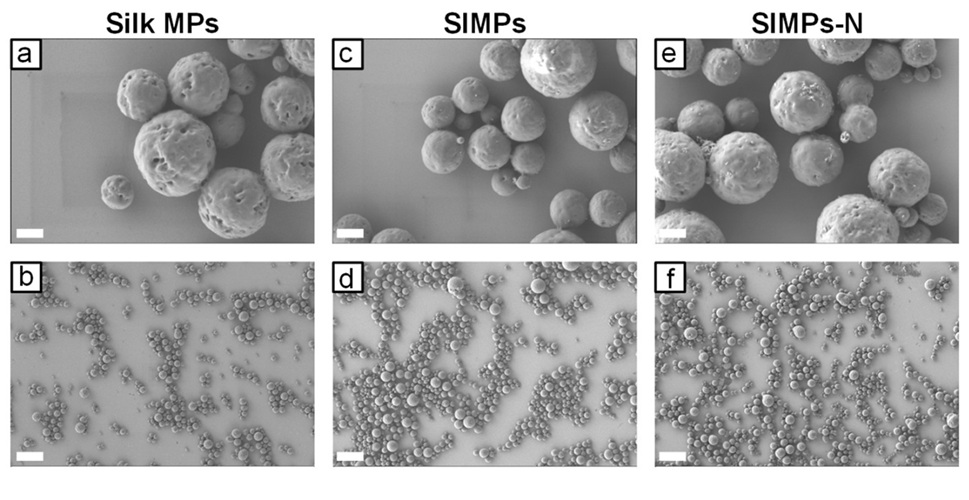
Magnetically Navigable Microparticles Enable Targeted Drug Delivery
Abdominal aortic aneurysms (AAA) can be life-threatening if not treated and result in nearly 10,000 deaths annually. Researchers working to improve treatments for AAA could now make it possible for doctors... Read more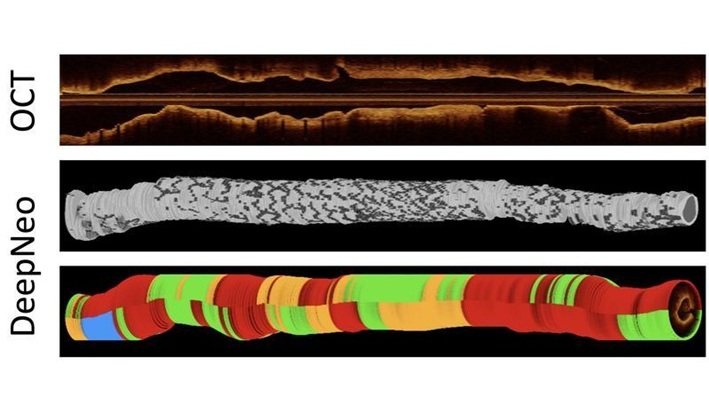
AI-Powered Algorithm Automates Analysis of Coronary Stents After Implantation
Every year, over three million people globally receive stents to open blocked blood vessels caused by heart disease. However, monitoring the healing process after stent implantation remains a significant challenge.... Read morePatient Care
view channel
Portable Biosensor Platform to Reduce Hospital-Acquired Infections
Approximately 4 million patients in the European Union acquire healthcare-associated infections (HAIs) or nosocomial infections each year, with around 37,000 deaths directly resulting from these infections,... Read moreFirst-Of-Its-Kind Portable Germicidal Light Technology Disinfects High-Touch Clinical Surfaces in Seconds
Reducing healthcare-acquired infections (HAIs) remains a pressing issue within global healthcare systems. In the United States alone, 1.7 million patients contract HAIs annually, leading to approximately... Read more
Surgical Capacity Optimization Solution Helps Hospitals Boost OR Utilization
An innovative solution has the capability to transform surgical capacity utilization by targeting the root cause of surgical block time inefficiencies. Fujitsu Limited’s (Tokyo, Japan) Surgical Capacity... Read more
Game-Changing Innovation in Surgical Instrument Sterilization Significantly Improves OR Throughput
A groundbreaking innovation enables hospitals to significantly improve instrument processing time and throughput in operating rooms (ORs) and sterile processing departments. Turbett Surgical, Inc.... Read moreHealth IT
view channel
Printable Molecule-Selective Nanoparticles Enable Mass Production of Wearable Biosensors
The future of medicine is likely to focus on the personalization of healthcare—understanding exactly what an individual requires and delivering the appropriate combination of nutrients, metabolites, and... Read more
Smartwatches Could Detect Congestive Heart Failure
Diagnosing congestive heart failure (CHF) typically requires expensive and time-consuming imaging techniques like echocardiography, also known as cardiac ultrasound. Previously, detecting CHF by analyzing... Read moreBusiness
view channel
Expanded Collaboration to Transform OR Technology Through AI and Automation
The expansion of an existing collaboration between three leading companies aims to develop artificial intelligence (AI)-driven solutions for smart operating rooms with sophisticated monitoring and automation.... Read more










